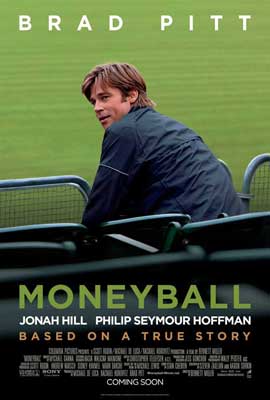
How can you not be romantic about baseball?" says Oakland Athletics general manager Billy Beane in “Moneyball.” It’s a question tinged with sarcasm. Beane (a slyly intelligent Brad Pitt) never watches his team play, catching snatches of the games on TV or radio.
Insulating himself from the emotional swings of headfirst dives into home plate and heartbreaking strikeouts, the real-life Beane learned to see baseball analytically. He challenged a sport trussed up in tradition, rejecting magical thinking about lucky streaks, jinxes, weird rituals and overpaid superstars. His data-driven approach took the game out of the realm of voodoo and into predictive data mining.
At Beane's side in the film is Peter Brand (a character based on A's assistant GM Paul DePodesta, who requested not to be named in the film), a naive Yale economics nerd with an eye for underpriced talent. Brand, played by Johan Hill, helps Beane draft young, inexpensive players and unwanted, affordable veterans with high on-base percentages. With their band of "misfit toys," they transform the small-market A's into a juggernaut.
The film marbles together the Athletics's record-breaking 2002 season with flashbacks to Beane's failure-haunted past, including a failed marriage. Director Bennett Miller ("Capote") and screenwriters Steve Zaillian ("Schindler's List") and Aaron Sorkin ("The Social Network," TV's "The West Wing") nimbly sidestep every cliche along the way, viewing the game of baseball through the prism of stats and business.
Just as Beane becomes a game-changing force, the film itself creates a new formula for sports movies. A scene with Pitt and Hill in sublime comic harmony as they coordinate rapid-fire player trades while juggling phones is as exhilarating as a triple play.
"Moneyball" was adapted from Michael Lewis's nonfiction best seller by some of the same folk (Sorkin, most notably) who gave us last year's "The Social Network." It has a similar focus on a misunderstood, blunt-spoken visionary and a similar air of cool, perceptive brainpower. It's not really a sports movie at all, but a tale of outsiders who defy conventional thinking.
The baseball establishment, perhaps best personified by a prickly Philip Seymour Hoffman as headstrong Athletics manager Art Howe, battles Beane and Brand every step of the way. And there are plenty of colorful old school guys hanging around the A's clubhouse, a merry crew that provides many of the film's laugh-out-loud moments.
One veteran scout nixes a prospective player because "he has an ugly girlfriend" -- and therefore no self-confidence -- a wonderfully flawed and subjective pronouncement. These old shamans are shaken up by Beane's new computerized-evidence-beats-intuition vision of the game, but not nearly as shocked as the deep-pocketed New York Yankees, overrun by the team with the smallest player payroll in the league.
Pitt's Beane is as original a character as I've seen in a baseball drama. He's a driven, disappointed athlete, his youthful dreams of World Series glory crushed but still smoldering. He passed up a full scholarship at Stanford in favor of a big-money outfielder's position for the New York Mets. He never became the top player the recruiters anticipated.
He never even learned to give those stirring locker-room speeches that sports movies are all about. Beane's big pep talk is five seconds of silence. How can you not fall in love with a movie like that?
No comments:
Post a Comment